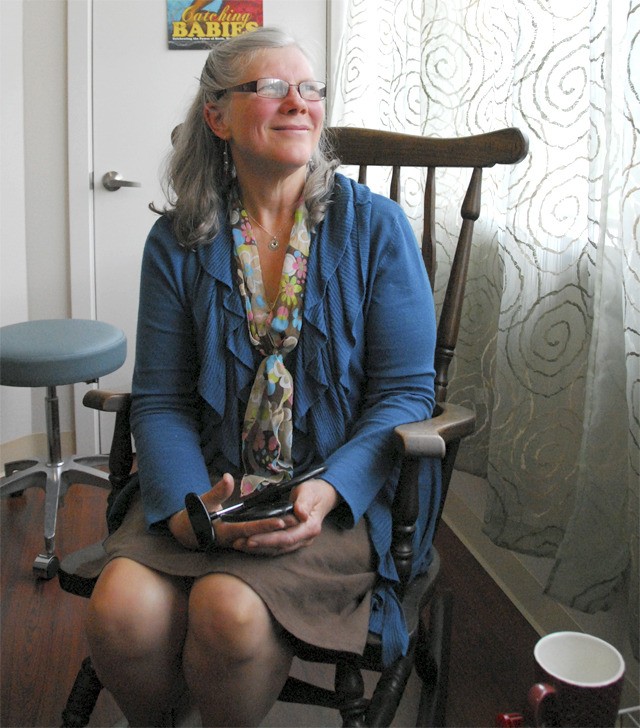What she said was “My belief is every woman deserves a midwife.” What that means, especially to those not familiar with midwives, is that every woman should enjoy a special relationship with their health care practitioners.
Roxanne Spring, a certified nurse midwife, explains, “Midwife means ‘with woman,’ so when you come in for an appointment to discuss your health… would you not rather sit down and talk with someone who honors the fact that you and your body are very important in this pursuit of health and well-being? That your body’s wisdom is very vital? Because we are actually built to heal.”
On a traditional visit to a doctor, Spring said, a pregnant woman might not get the time and attention she wants to discuss all of her concerns, or any changes that might be happening during the pregnancy.
Offering that time, Spring says, “is an integral part of the quality of care that I want to provide. That’s the commitment.”
Oftentimes, especially after a baby is born, Spring will commit further, by seeing the mommy and baby at their home. It’s easier on the mommies, she says, and likely, improves her quality of care.
By spending the time and building relationships with her mommies, she explained, she can “see them as a whole person,” she said, and care for them as such — “because context is important!”
Spring, a practitioner since 1998, almost bubbles with information about her field.
“It’s just been a phenomenal part of my life,” she said. “Motherhood, pregnancy, breastfeeding, eating healthy, and the lifestyles that are family centered have been the core of my life, for many years.”
Officially, midwives are licensed health care providers who tend to women, and their families, throughout their pregnancies. Nurse-midwives like Spring can provide life-long health care for women.
All midwives support women’s physical, psychological and social well-being needs, provide education and counseling and offer postpartum support. They can prescribe drugs, too, but prefer to avoid such interventions, especially during a woman’s labor.
“Birth and labor are very, very unpredictable in real life, just like life is unpredictable,” Spring said.
Hospitals may try to minimize that unpredictability by administering drugs to induce labor, or other interventions. Midwives, however, are known for their role in natural births — no doctors, no pain killers, and often, no hospitals.
Since opening her practice in North Bend a few months ago, Spring has exclusively done out-of-hospital births, but she hopes to develop a relationship with an obstetrician so she can deliver in-hospital again in the future. In her career, she’s worked at both Overlake and Evergreen Hospitals as a midwife, and has been dismayed to find that “the interference with the natural process has become much more commonplace.”
It’s not a criticism. Traditional doctors will always have a place, she said, and “I’m grateful for medical knowledge.” Some women in fact, should see only traditional physicians while pregnant, if they are at high risk.
Midwifery is a safe option for low-risk pregnancies, between 60 and 80 percent of pregnancies, according to the American Pregnancy Association. It’s also becoming an easier choice to make, as insurance companies begin to cover midwifery. Spring is actually a preferred provider for several insurance companies.
It’s a welcome change, for Spring, who used to offer childbirth education classes.
“People would be incredibly motivated to have a birth of their choice, and then they would have to navigate a system and a provider that they thought were on the same page, and they really weren’t,” she said.
Spring estimates she’s delivered more than 500 babies as a midwife, which doesn’t include her own six children.
She started practicing again after her children were born because “I needed another outlet for this passion of mine!”
Snoqualmie Valley Midwifery is located at 401 Ballarat Ave. N., North Bend, (425) 888-1018.
Learn more at http://snoqualmievalleymidwifery.com.



